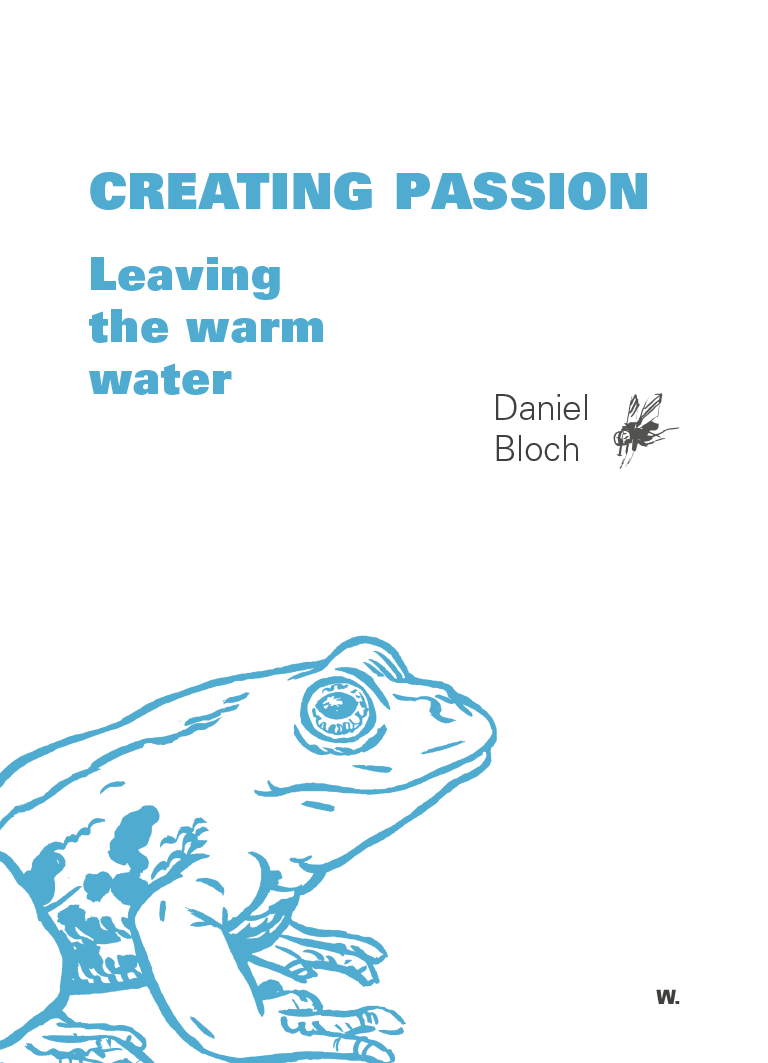


Daniel Bloch
Creating PassionLeaving the warm water

CreatingPassion
“MAN IS WHAT HE BELIEVES.”
Anton Tschechow, author and playwright

Sales and distribution Switzerland: Weblaw AG,Bern, Switzerland
Sales and distribution international: Nova MD GmbH,Vachendorf, Germany
ISBN 978-9-906973-07-4
© W. by Editions Weblaw, Bern 2018
All rights reserved by the publisher Editions Weblaw, including re-prints of extracts or individual contributions. Any use without the express consent of the publisher is forbidden. This applies in par-ticular to duplication, translation, microfilming as well as storage and processing in electronic systems.
Design: Alice Blumer – Illustrations: Benjamin Güdel Flip book: Eva Zurbriggen – Photo biography: Christian Scholz
“Daniel Bloch’s success is based on fundamental values:hard work, reliability, modesty and attention to detail.Everything he undertakes is done with inspiration,enthusiasm and joy.Very apparent is his sense of loyalty to the Bernese Jura.We have so many values in common.”
Rudi Bindella, entrepreneur and restaurateur
“Camille Bloch represents the tradition Swiss values that have given its chocolate its international reputation. The new Dis-covery World CHEZ Camille Bloch brilliantly combines the family’s and company’s cultural heritage. Thank you, Daniel, for your unconditional support of the Salon du chocolat.”
Sylvie Douce, co-founder of the Salon du chocolat
“Running a family business sometimes forces us to leave our comfort zone where we naturally feel more at ease. As with hot-air ballooning, you first have to throw out some ballast before you can fly; something that Daniel Bloch has ably mastered over the years.”
Bertrand Piccard, psychiatrist and adventurer
“I read Creating Passion in one day. It was a pleasure to read and it gives unique insights into the history and strategy of a multigenerational family in business – I particularly en-joyed reading it from the view of Daniel Bloch and following his reflexions and thought processes before big decisions are made – and history created. I warmly recommend the book to anyone from or interested in family business.”
Lise Møller, Executive Director, INSEAD Wendel Interna-tional Centre for Family Enterprise
“A great little book, gripping and personal. Pertinent ques-tions about family businesses are answered creatively. Daniel Bloch brilliantly manages the balancing act between telling a story and sharing his insights into what makes for success. The book should be in every company library.”
Thomas Zellweger, professor at the University of St. Gallen
TABLE OF CONTENTS
Foreword ...........................................................................15
Go for it, Baby! .................................................................23
Part 1 – What makes sense? ..............................................31
Part 2 – Share – the common endeavor .............................55
Part 3 – Blond rocks: Dare to be unique ............................73
Part 4 – The ambition “Authenti-Cité” .............................91
Part 5 – The vision makes the difference ........................107
Concluding remarks .......................................................131
Acknowledgements .........................................................137
Biography .......................................................................143

forEsther


“WHAT IS NOT WRITTEN DOWN IS THOUGHT IN VAIN.”

15
FOREWORD
In July 2016, I returned to INSEAD (Institut Européen d’Ad-ministration) business school at Fontainebleau, France, where I had completed my Master of Business Administra-tion (MBA), for a reunion with my contemporaries, 20 years after graduating. It seemed to me an appropriate occasion to reflect on what we had learnt. What trends, theories and visions held sway back then as we set out on our careers? Which of the major subjects and methods we were taught are still valid in practice today, what remains important to me and what has proved irrelevant or even untrue?

16
I am deliberately writing this from the perspective of an atypical graduate from such a business school. Most of my contemporaries were aiming at securing a good position with a global player, one of the respected consulting firms such as McKinsey or a well-paid job at a major investment bank. Back then in the mid-1990s, few graduates thought of starting their own company. The digital age had not yet fully kicked in, where a start-up based on a single good idea could, starting from scratch, grow to surpass the market val-ue of long-established corporation in just a few years. No, I would rather describe the 1990s as a period of consolida-tion: after computers had become ubiquitous in everyday life but before the great tidal wave of the digital revolution had gained momentum. For most graduates at the time, a career with one of the major international corporations was the option of choice.
The idea of working for a smaller, traditional, family busi-ness geared more to the domestic market, like my designat-ed future employer Chocolats Camille Bloch, was definitely out of favor. For ambitious young graduates, such compa-nies seemed to offer few opportunities for promotion, little prestige and only modest rewards. However, as the grand-son of the founder, Camille Bloch, I had promised my fa-ther that on completing my education I would enter the family business. Thus I didn’t see much point in taking part with the others in the recruitment circus, a process whose
17
main aim was to land a good job. Large companies have always been intent on attracting young talent, and one way of achieving this at Fontainebleau was through their strong presence on the campus. Here, appointments were made for interviews which would later be held at the headquarters of the companies concerned. At the time, my only regret was that I felt somewhat excluded when it came to their lively anecdotes about lavish head offices, tricky interview ques-tions and attractive job offers.
Today, I am glad that I didn’t have to get swept off my feet by accepting one of these deceptively enticing offers. None-theless, with hindsight, I am sorry that I didn’t have the opportunity to prove myself through the selection process. I would have benefitted from having had to define my own points of view,from acquiring a greater awareness of my own strengths and weaknesses, and from having to subject myself to the judgement of professional interviewers. Later I learned how to assess myself, to examine my motives and thereby discover what I was capable of. Even today, this still helps me to handle the challenges of everyday life.
Later in my career, I did have plenty of opportunities to ex-perience my impact on a critical audience. For example, on the numerous occasions when I was invited to give lectures, which were particularly well-received when I was able to reveal some of my own personal experience. In public life

18
I have always felt that, as the representative of a respected Swiss family business, I had a duty to express my points of view clearly. Not consciously seeking public attention, but more out of a love of the subject, after repeated requests I finally agreed to take part in competitions where entrepre-neurs or their businesses were competing for awards.
Thus it was that the main idea for this book came to me when I was competing for just such an award, the Ernst & Young (E&Y) “Entrepreneur of the Year 2015”, where I had to convince two members of the jury of my entrepreneur-ial skills. Even though I did not finally win the competi-tion, it made me more aware of the qualities and skills that had helped me succeed in my business career and, above all, how far these differed from conventional management techniques. Had I won the award, I would have turned down the prize money but instead asked E&Y to support the publication of this book. Well, although it didn’t turn out that way, the seed had been sown and so I decided to go ahead and put my thoughts down on paper.
In “Creating Passion” I relate events and experiences from my own company from a somewhat different, personal per-spective. To me, the English word “passion” seems more apt than the prosaic German word “Leidenschaft”, perhaps be-cause it is the same as the word “passion” in French, the first language I learnt as a child. Only later, when I went to
19
school in Bern, did German become the language in which I could express myself most clearly. Despite this, to this day French remains my “langue du cœur”.
Passion is indisputably a driving force, yet in the world of business, and particularly in business literature, it does not always have a good reputation. It cannot be analyzed, can-not be measured and cannot be planned; indeed some won-der whether it can be influenced at all. Can the conditions under which people do things with their heart and soul real-ly be channeled and controlled? Probably not directly. None-theless, my experience and my intuition have taught me that favorable conditions can be created in a company where pas-sion can flourish. That is what this book is all about.
My reflections are primarily addressed to ambitious and tal-ented young people who, like me, after completing an MBA, are about to enter business life. I want to encourage them to consider a career in a well-established family firm, as many such companies have nurtured an active entre-preneurial spirit over generations. They think long-term, accept that mistakes happen learn from them, and finance products for the future with money earned in the past. Above all, unlike many major corporations, medium-sized enterprises are of-ten better at taking the needs of individual employees into account, thereby making them an integral, indeed an essen-tial, part of a common endeavor. In addition, young people

20
who have not yet climbed all the rungs of the management ladder but nevertheless have good ideas, can often make a greater difference in a smaller company than in a large one.
It is not my aim to write a textbook, and thus no attempt has been made here to provide an exact definition of the word “passion”. Instead, the book is designed to be read easily, to give the reader an insight into the forces at play in an SME – based on my own experience of a vibrant company. When it comes down to it, passion will always remain something of a mystery, arising out of the conflict between order and chaos, fantasy and realism, creativity and routine, the pres-ent and the future, individual needs and the bigger picture.

“TRUTH ISCONCRETE.”
Bertolt Brecht, author and playwright

23
GoFor it,BABY!
When a problem arises, it needs to be resolved as quickly as possible. What is needed are dynamic people who are ready, willing and able to see the problems and sort them out as quickly as possible. The faster they are cleared up the better. It is therefore no surprise that such skills are also taught in many vocational training and further education courses. For many years I was an interviewer for the admission of candidates to the INSEAD MBA program. An essential cri-terion for evaluating the potential of candidates was – and probably still is – their ability to solve problems. Our aim was to foster problem solvers who could sometimes even find solutions to problems which had not hitherto existed. I also experience this phenomena when dealing with political

24
situations with which I am confronted as an entrepreneur. If we had not been created by the Almighty but by politicians, we would surely not have had just five fingers but at least fifty on each hand, in order to deal with all the challenges we are faced with every day.
Leaving a question unanswered until a solution presents it-self, maybe not only to this question but to others related to it without having previously seen the connection between the various questions – this corresponds closely to my ap-proach today and is what this book is all about. Like the five fingers on one’s hand, it is divided into five parts. In each part I describe in chronological order a particular situation which has had a strong influence on me. It is well known that real life writes the best stories. I recount some of them here to show how they have taught me to pay special at-tention to certain very specific conditions, to find compre-hensive solutions that are wider ranging than the initial problem, thereby opening up new options and creating new perspectives in order to fully mobilize new energies. Ener-gies which suddenly make it possible for an organization to shake off constraints, unleash creativity, achieve goals and move ahead faster in a shorter space of time than in decades before.
25